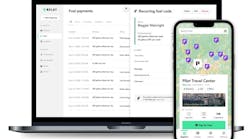The death of the private fleet has been just around the corner for over a decade. Outsourcing to dedicated carrier operations, third-party logistics providers or some other type of transportation specialist was supposed to sweep through American business, replacing company fleets with distribution systems that were less costly and/or more efficient.
Certainly, businesses have moved to outsource some of their fleet duties, especially linehaul operations. Despite expectations, however, today over two-thirds of all commercial trucks are still operated by private fleets, and the equipment ratio between for-hire and private has remained relatively unchanged over the years.
What has changed — and changed in a major way — is the role of the private fleet manager. Today, the person or team managing a company's transportation functions must be comfortable assessing information-technology needs, evaluating a broad range of outsourcing options and, most importantly, understanding the financial implications of various private fleet scenarios for the company's overall business.
“Having a great record on safety, driver retention and maintenance just isn't enough anymore,” says Gary Petty, president and CEO of the National Private Truck Council (NPTC). “Today's transportation managers have to understand the bigger picture, which is how their transportation infrastructure expedites moving the company's products to market.”
Take information technology, for example. While many private fleets were quick to adopt onboard computers over a dozen years ago, few have taken the next step to wireless communications and real-time access to the information collected by those systems.
“The move away from post-trip analysis [from onboard computer data] to real-time management of private distribution fleets has been slow,” says Jim Scales, director of sales for the satellite communications company Norcom Inc. “Ten or twelve years ago, truckload carriers made that switch quickly. But for most companies with private fleets, technology still stops at the loading dock.”
The problem, Scales says, is that too many companies still view their fleet as a cost center, not a profit center, “and that makes it easier to not spend money on an expensive IT system like wireless.”
Private fleet transportation directors “have to look beyond their realm of immediate responsibility — daily costs — and see things from the 5,000-ft. level,” says Scales, who in his career worked with the former Rockwell Corp. to help launch the original Tripmaster OBC. He also managed private fleet sales for the Fleet Advisor transportation management system recently purchased by Qualcomm from Eaton Corp.
With many companies investing in broad extended resource planning (ERP) logistics systems, “why shouldn't they take it out to the truck, treat that mobile asset like it's a fixed asset?” asks Scales. Some private fleet managers, especially those running fleets for food wholesalers, are moving to real-time wireless systems, he says, but few other segments match their appetite for new technology.
“Some private fleet managers do see the value of moving OBC functionality to real-time, and as the costs come down for wireless hardware and service, the number will grow because productivity issues are still important in all types of private fleets,” he says.
Finding the money to buy optimization tools like wireless data systems can be difficult in the current economic climate, where most businesses are experiencing a downturn, says Vin McLoughlin, chairman and CEO of Cardinal Logistics Management, a former truckload carrier that is now solely focused on dedicated contract carriage. “There are some valid reasons to run a private fleet, but in downtimes like these, companies are more open to an objective evaluation of outsourcing with a dedicated carrier.”
With a customer list that includes Home Depot, Office Depot and Coca-Cola, Cardinal has grown its dedicated carriage annual revenues from $0 in 1997 to $150 million last year. The company sold its original truckload operations to Swift Transportation earlier this year to concentrate on its dedicated business, which it expects to grow by $80 million this year.
Outsourcing a private fleet operation takes “a leap of faith because you're turning over an absolutely critical part of your business,” says McLoughlin. “Private fleets exist because they meet the high service imperatives of highly specialized distribution systems, and not too many people are asking for worse service these days. In most cases, drivers are the last people to see your customers.”
While Cardinal performs that service well for many large customers with complex transportation needs, “outsourcing 100% of all private fleet operations won't happen, and it shouldn't,” says McLoughlin. “Tightly run private fleets that truly know their costs aren't good candidates for outsourcing because we can't add anything there.”
The best candidates for conversion are those fleets “that are over-trucked, pay drivers too much or the wrong way, don't have a P&L statement, or don't control workers' comp costs,” he says. But even if an organization has good control of its transportation costs, “I think it's incumbent on all private fleet managers to keep looking at the option periodically,” McLoughlin says.
If you put “pure private fleet” at one end of the scale and “pure outsourcing” at the other, today's private fleet managers “have to be aware of everything in between, to understand all the options and financial implications of those options,” says NPTC's Petty. “The burden is on fleet managers to be proactive in considering new solutions even if they end up reaffirming their current model.
“The economic realities of business are such now that you have to be in a position to offer your company new transportation solutions or defend the current solution,” Petty says. “Otherwise, forces further up (in the company) are going to make unilateral decisions based solely on finances. That doesn't mean you have to be an advocate of any one approach, but just conversant in the argument for each of the options.”
In practice, companies with private fleets, especially larger ones, “are embracing all kinds of combinations (of in-house and outsourced services), depending on their needs in any given area,” Petty adds. “Today's private fleet operation isn't bound to any one model and is constantly searching for a better deal.”
Transportation managers in the private arena also have to become familiar with technology options, especially when it comes to understanding the cost benefits of specific systems. “Investing in the right information technology can give a company a competitive advantage and affirm the private fleet as a viable business model,” Petty says.
Whether it's buying the right fleet technology or handling the merger of fleets acquired in business consolidation, private fleet transportation managers need ever more sophisticated decision-making capabilities. “Today's professional transportation managers have to understand the financial implications of their fleet operations as they exist now and as they might evolve in the future,” says Petty. “That requires new training and exposure to the financial side of business, exposure that wasn't all that common for transportation managers just a few years ago.”
Faced with such a wide range of new issues and options, the modern private fleet manager's best defense isn't a single strategy or business model, but rather a broader perspective of transportation and a broader knowledge of how the private fleet can serve as a valuable business tool.
Leasing: Read the fine printChoosing the right truck leasing company or broker requires some homework; it's essential to know who you're working with and what you're agreeing to. Rick Wilbur, managing partner for Media Capital Assoc., an Arizona-based leasing company, recommends that fleets keep a close eye on the following:
-
Pre-approval. Some leasing companies use a tactic called the “pre-approval,” which implies that approval has already been granted. In reality, says Wilbur, the term is quite deceptive. It's often used to get a lessee to send a check or sign a set of documents before the leasing company has committed to the transaction.
-
Formal approval. Get formal approval in writing. It should include all aspects of the approval, any contingencies and how long it will be valid.
-
Deposit requirement before credit approval. Some companies will require a deposit before they issue a formal approval of the lease contract. The deposit is used to ensure that the lessee is serious about a contract before the leasing company spends its resources issuing a commitment. If the transaction is approved, funds from the entire deposit should be applied to the lease's advance rental requirements, Wilbur says. If the transaction isn't approved within a reasonable period of time, the fee should be fully refundable.
-
Monthly rental fees. Understand what the monthly payment covers. Some companies include sales tax in the quote — and then tack on a “use tax.” Wilbur points out that they should not charge both sales tax and use tax.
-
Equipment acquisition cost. This varies from company to company; it includes things like tax, shipping, training, warranties and other “soft costs,” says Wilbur. Make sure you know exactly what the leasing company is willing to pay for; you're responsible for everything else.
-
The lease factor. This number enables you to calculate how much of your payment is actually a finance charge. For example, for a 36-month lease, a factor of 0.0330 indicates that you're paying the leasing company 118% (3.3% x 36 ) of the actual equipment cost. This means the finance charge for the three-year period is 18%.
-
Extra fees. Ask about documentation and filing fees upfront; they can range from hundreds to thousands of dollars.
-
Purchase option. Make sure the leasing contract specifies what the purchase option is and what assets it pertains to. Get everything in writing. Insist that all terms and conditions required for you to exercise this option are identified in a separate letter. Sometimes companies offer what seems like an attractive purchase option, but scatter the less-attractive details related to exercising the option throughout the lease documents. Failing to exercise the option properly can mean an automatic lease renewal for 12 more months.
-
Renewal clauses. Some lease agreements contain obscure renewal clauses that require the lessee to notify the lessor whether or not they're going to exercise the purchase option at a specific point during the lease term. If the lessee fails to comply with the requirement in a timely manner, the lease is automatically renewed. Be wary if the renewal period is greater than month to month; sometimes it can be for a full year, which means you're responsible for 12 more payments.


